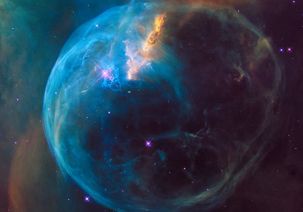 Of all the explanations for the universe by mankind over the millennia, from the scientific to the religious, the Big Bang Theory is the one most favored by physicists as the explanation for the origin of our universe. Today, however, ever more physicists are rethinking a huge part of that theory: the idea that the infant universe underwent an exceedingly tiny (one trillionth of a trillionth of a nanosecond) period of exponentially rapid inflation immediately after the Big Bang itself that produced the universe as we know and observe it today.
Of all the explanations for the universe by mankind over the millennia, from the scientific to the religious, the Big Bang Theory is the one most favored by physicists as the explanation for the origin of our universe. Today, however, ever more physicists are rethinking a huge part of that theory: the idea that the infant universe underwent an exceedingly tiny (one trillionth of a trillionth of a nanosecond) period of exponentially rapid inflation immediately after the Big Bang itself that produced the universe as we know and observe it today.
Originally proposed by Belgian astronomer — and Catholic priest — Georges Lemaître in 1927, the Big Bang Theory holds that the universe began from a singularity; i.e., a point in space-time with infinite density and temperature, that exploded. The explosion was immediately followed by a period of exponential expansion that smoothed out the “wrinkles” in the new universe, resulting in the uniform, a/k/a flat, universe scientists observe today.
Lemaître’s theory was backed up by noted American astronomer Edwin Hubble, for whom the famous Hubble Telescope was named. He observed the red shifts of the galaxies, concluding that the universe continues to expand. In addition, the cosmic microwave background radiation left over from the Big Bang was discovered in 1964 by American radio astronomers Robert Wilson and Arno Penzias.
Thereafter in 1980, another theoretical physicist, Alan Guth of the Massachusetts Institute of Technology, came up with the idea of the infant universe undergoing a single inflationary period during which it expanded exponentially at a billion times the speed of light. This would account for the “flat,” homogeneous universe we see today, and is analogous to the apparent flatness of the earth we humans observe from our limited perspectives of our own planet.
Recent Alternate Expansion Theory
In 2010, however, Princeton University theoretical physicist Roger Penrose proposed a radical new idea: conformal cyclic cosmology. According to his book “Cycles of Time: An Extraordinary New View of the Universe” published that year, the idea of a single exponential inflation after the Big Bang is wrong. Instead, he posited that our universe goes through multiple expansion and contraction cycles where the distant future timelike infinity of each cycle becomes the “big bang” singularity of the next. In other words, per Penrose, our universe didn’t so much begin with a big bang as with a big bounce.
Needless to say, Penrose’s ideas were met with resounding silence by inflation aficionados in the scientific community. After all, one does not take an accepted scientific theory and blow it to bits, regardless of the fact that the scientific method that scientists tout supposedly consists of systematic observation, measurement, and experiment, with the consequent formulation, testing, and modification of hypotheses, new or existing.
New Criticisms
As time went on, however, more and more scientists began criticizing the inflation portion of the Big Bang Theory. For instance, in 2017, physicists Abraham Loeb, Anna Ijjas, and Paul J. Steinhardt argued in “Scientific American” that inflation proponents did and do nothing more than game the system and that their conclusions were unscientific. What was once a relatively simple and straightforward Big Bang Theory has morphed into a highly complicated theory as inflation proponents simply add another layer to it to explain whatever new wrinkle appears. In other words, inflation proponents simply fit the Big Bang Theory to the new data, rather than the other way around. Loeb et al consequently called inflation an “empty theory,” stating that “Inflation is such a flexible idea that any outcome is possible."
Angered over this criticism of their methods and their theory, Guth and 32 additional prominent inflation adherents, including the late Stephen Hawking, published a formal rebuttal. They defended inflation as a testable, evidence-based theory that has produced numerous successful predictions.
And so the great debate continues and shows no sign of letting up any time in the foreseeable future. It is important to note that scientists are not attacking each other personally - rather, they are doing what they've always done: searching for more information, and testing and reproducing observable phenomena in the pursuit of knowledge. Ultimately, the Big Bang Theory and it's component parts are open to question and interpretation - that is the essence of science.